Updated January 11, 2026
Healthcare SEO: 14 Expert Strategies, Key Trends & a Real Case Study
If you’ve been in SEO for decades but haven’t touched healthcare SEO campaigns, don’t beat your head, because a lot of stuff is completely different here. The same statistics, strategies, or best practices usually don’t work in this sector, because in healthcare, you’re dealing with people’s lives, and Google takes full responsibility.
I’ve been thinking for over six months about writing a healthcare SEO guide, but something kept pushing me back. Plus, I wanted to see how the latest changes in AI search would impact organic rankings in this sector.
Finally, I’m ready to share everything I’ve gathered drop by drop over the years, the kind of stuff others bundle into high-ticket packages (haha, joking). If you’re sitting comfortably in your chair and your TV’s off, let’s get started.
What Is Healthcare SEO?
In simple words, healthcare SEO is the process of improving how easily people can find your medical website on Google when they search for services like “physical therapy clinic in Miami.” It’s about helping your clinic, hospital, or health business appear higher in organic search results, so patients find you before they find your competitors.
In healthcare, trust and accuracy matter more than anything. So, healthcare SEO also means making sure your website content is medically accurate, written clearly, and easy to navigate, because Google and your patients are paying attention.

The overall SEO concepts, like technical optimization, keyword research, content quality, backlinks, and user experience, are the same in healthcare SEO. But how you apply them is very different.
In healthcare, you’re operating in a YMYL (Your Money or Your Life) category. That means Google holds these sites to a higher standard. So you can’t just write SEO-friendly content; you need medically reviewed, trustworthy, and often expert-written content to even stand a chance.
14 Healthcare SEO Strategies for 2026
If your heart’s beating, you already smell success in all this, and you can picture exactly how you’ll implement each of my tips, which aren’t just paraphrased from someone else’s article.
Most of what I’m sharing here is the result of hands-on campaigns, painful experiments, and hours spent digging through data that no SEO tool shows at first glance. Some of these insights were only possible because I kept testing long after others gave up. So, I won’t waste your time. Let’s get straight into it.
1. Create Location-Specific Medical Service Pages
If you’re running a multi-location dental clinic, a chain of urgent care centers, or a dermatology group with offices spread across a state or even just a couple of cities, this is a perfect strategy.
Google wants to give people local results. Someone searching for “pediatric dentist in Scottsdale” isn’t going to get excited about a generic nationwide services page. They want to see an actual Scottsdale clinic, with an address, directions, staff photos, local testimonials, something that says “We’re in your neighborhood, and we get your needs.”
Let me give you an example. Say you’re running an orthopedic clinic with three locations: Phoenix, Glendale, and Tempe. Each one should have its own page like “Knee Replacement Surgery in Phoenix”, “Sports Injury Treatment in New Jersey”, and “Arthritis Care in Tempe.”
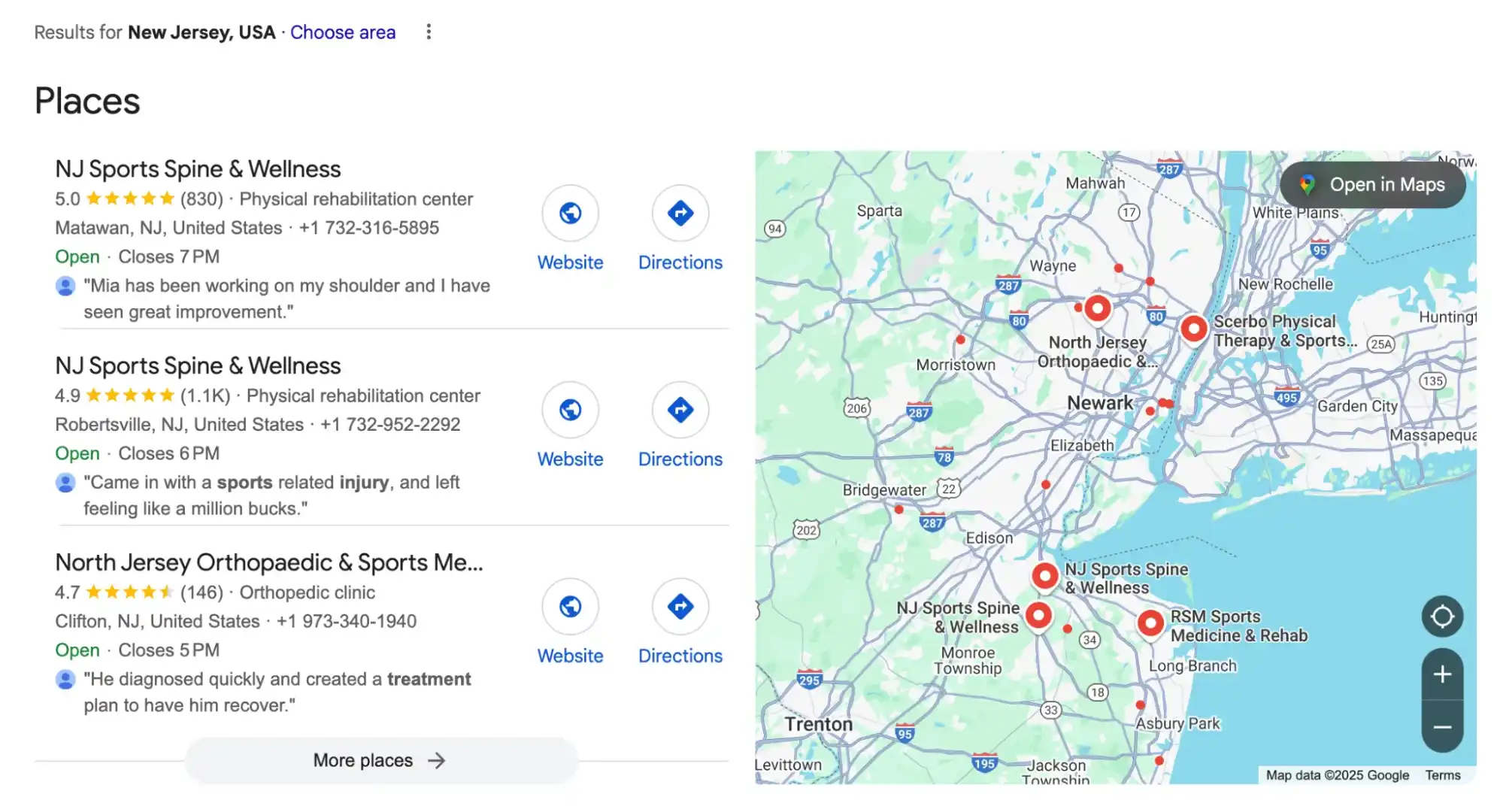
Each page should include the exact services offered at that location (not just a generic list), a Google Map embed, maybe a photo of the actual facility, directions from popular nearby areas, and reviews from patients at that branch.
Another good example: Last year, our SEO agency helped a client with multiple radiology centers across Southern California. Their homepage was getting all the traffic, but conversions were low.
We broke down their services by city and created pages like “MRI Scans in Irvine” and “CT Scan Services in Pasadena.” Each one was customized with service-specific FAQs, insurance details accepted at that branch, and even info about parking.

But if you want to go deep with this strategy, don’t just think about city pages. Add schema markup for each location. Use Google Business Profile posts to promote those pages. Interlink your location pages smartly, but don’t duplicate the same structure blindly.
For instance, if Glendale has more elderly patients and you offer arthritis treatment, that’s your angle, or if Tempe is student-heavy, focus on sports injuries and fast recovery times.
2. Medical Schema Markup Beyond the Basics
Let me start from the basics. Schema is basically how you tell Google, “Hey, this page is about a doctor. Here’s their specialty. Here’s where they work, etc.” In short, it gives Google the info it needs in a format it can easily read, without extra effort.
In healthcare, schema markup matters way more than in most industries. Google takes health content seriously. It doesn’t just want to see a nice-looking website or a well-written blog.
Schema helps you give that proof in a structured, behind-the-scenes way. For example, if you’re listing providers, you can mark them up with things like their name, title, medical specialty, and even connect them to trusted platforms like Healthgrades or Zocdoc.
I know this stuff can sound technical, but you don’t need to code everything by hand. You can hire a fractional SEO consultant who’s dealt with healthcare sites before; they’ll know what to do.
If you’re into doing things yourself, you can even use ChatGPT to help you generate the markup. I wrote a full guide on how to use ChatGPT for SEO, and there’s a section in there about schema too. It’s way more useful than just using it for blog titles and meta descriptions.

Long story short: if you’re in healthcare and you want to show Google you’re legit, schema is a super way. Go beyond the basics, keep it accurate, and don’t be afraid to connect it with trusted third-party sources. Google needs those signals, especially in this space.
3. Use HIPAA-Compliant Conversion Tracking
You probably think SEO ends at rankings and traffic. However, you can’t fully measure SEO ROI if you’re blind to what users do once they visit your site. The thing is that healthcare websites can’t just add any form of tracking due to strict patient data regulations.
HIPAA (Health Insurance Portability and Accountability Act) sets strict rules on handling protected health information (PHI), anything that can be linked to a patient, including appointment requests, live chat data, form submissions, and IP addresses.
![]()
So if you’re using traditional tracking tools (like Google Analytics, Facebook Pixel, or heatmaps) without properly configuring them, you could be collecting PHI unknowingly. That’s a violation, and it’s a huge legal and financial risk.
I know it does not seem like an SEO strategy, but you can’t optimize what you can’t measure. For example, if your SEO campaign generates 10,000 monthly visitors, but you have no compliant way to track which ones turn into patients, that’s not good, at least. You won’t know which landing pages convert, which services perform well, or where to focus more.
Here’s what I recommend: start by using a HIPAA-compliant form provider. I have not tried dozens, but I believe you can use platforms like Jotform HIPAA, Formstack, or LuxSci to encrypt user data and offer Business Associate Agreements (BAAs).
Avoid tools that store IP addresses or allow session recording unless they are explicitly compliant. For example, session replay tools like Hotjar or Microsoft Clarity should be avoided unless they’ve been configured with a BAA and privacy settings that eliminate all potential PHI exposure. Instead, look into privacy-focused analytics platforms like Plausible or Matomo.
Make sure to remove all PHI from any tracking setup. Never send names, emails, or medical conditions into Google Analytics through form submission events or query parameters. Even something as subtle as “?condition=cancer” in a URL can land you in violation territory.
4. Create Condition-Symptom-Treatment Clusters
Here is another proven SEO strategy for the medical field from Ashot Nanayan, CEO and Founder of Digital World Institute (haha, tried to sound formal). Sounds a bit technical, but trust me, once you get the logic, it’s one of the simplest and most effective strategies you can implement.
Here’s the idea. You start with a core condition page, let’s say scoliosis. That’s your pillar. Then you create clusters around common symptoms, like “back pain in teens” or “uneven shoulders in children.”

Then, you complete the cluster with treatment-focused pages, like “spinal fusion surgery” or “chiropractic care for scoliosis.” Each page stands on its own but also supports the others.
In my opinion, this is a very effective strategy because you’re catching people at different stages: early concern, diagnosis, and treatment research, and you’re giving them a clear path through your site. Google sees it, too.
To increase your chances, you can also filter cluster keywords with an Ahrefs KD of around 15 to 20.
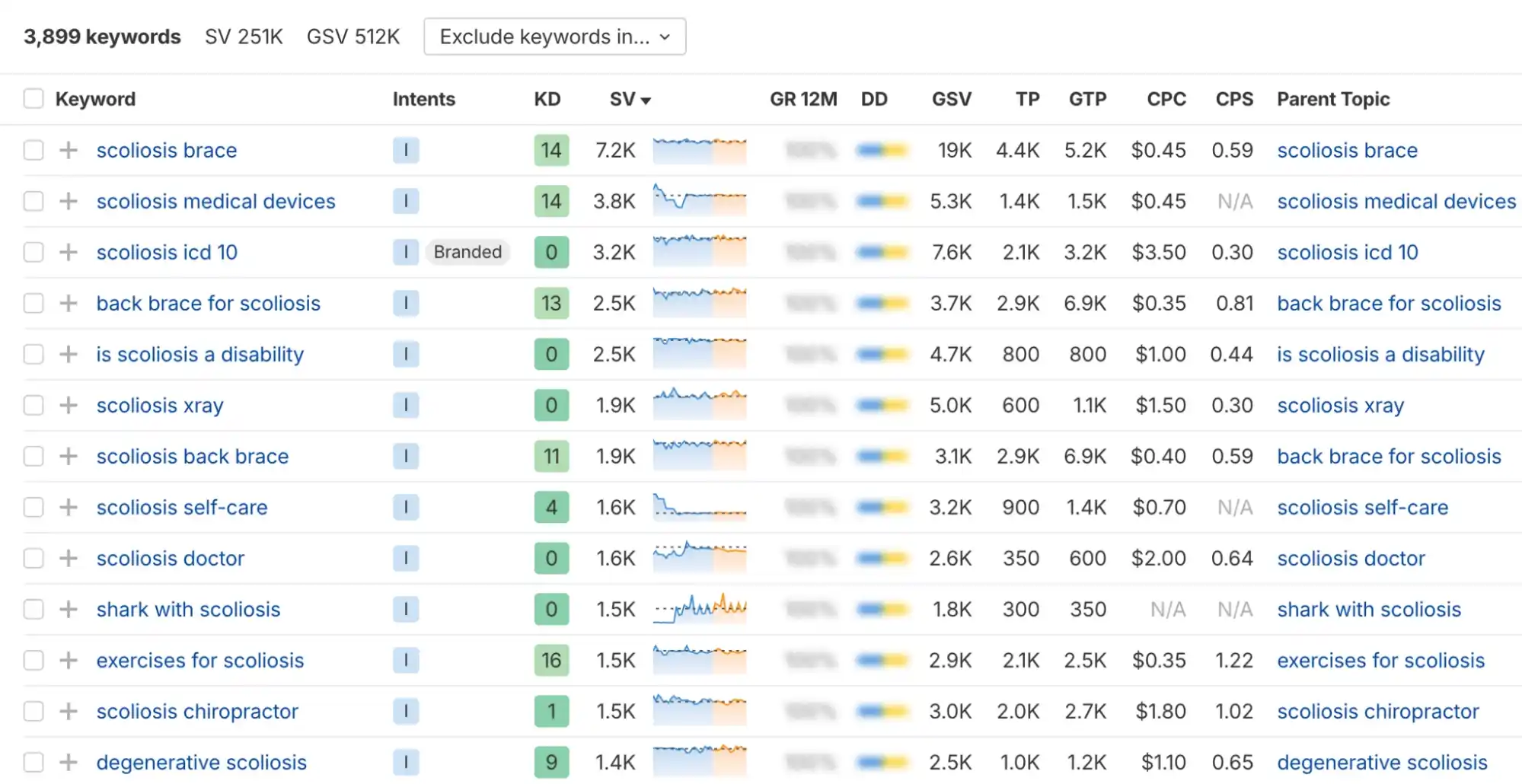
If you want to find some untapped opportunities, you can also use tools like AnswerThePublic. It groups keywords and breaks down questions by intent, and sometimes you’ll find ideas that even your competitors haven’t thought of yet.
Next, it’s very important to organize the internal linking structure. But, instead of saying “click here,” use natural anchor text like “signs of scoliosis in teens” when linking from the symptom page to the main scoliosis page.
From the scoliosis page, you can link out to “how spinal fusion works” and “non-surgical options.” Keep the flow logical. Don’t add no-sense links.
5. Medical Image SEO With Alt Text Describing Procedures
Most SEOs completely ignore image SEO (I understand, it’s very time-consuming), but you can’t afford to do that in healthcare SEO, especially when you’re talking about or selling specific medical procedures.
People don’t search for “doctor photo” or “surgery image.” They search for specific procedures, and if your image shows one, that’s your chance to help them understand what it looks like, without even reading a word.

Look at the image. Ask yourself: If I had to explain this to someone who can’t see it, in one short sentence, what would I say? That’s your alt text. Keep it natural. Don’t stuff keywords. Just describe what’s going on, clearly and honestly.
Don’t forget the file name. “img472.jpg” means nothing. Rename it, too. That’s another small signal Google considers. Next, compress the image and use the WEBP format. It keeps quality high and file size low. Especially important on healthcare sites where visitors are often using mobile devices and expect the page to load instantly.
6. Optimize for “Near Me” + Emergency Keywords
If you’re serving patients in a specific area (or areas), optimizing for “near me” and emergency keywords is another great move. People don’t search “pediatric urgent care for high fever in the United States.” They type “urgent care near me” or “ER for kids open now.”
I’m sure some agencies or even business owners think this is only effective for local SEO, but I’ve also used it in national SEO campaigns, especially when the brand has multiple locations or offices. So, if you’re running SEO for a healthcare brand with presence in several cities, targeting “[service] near me” in those metro zones still makes a lot of sense.
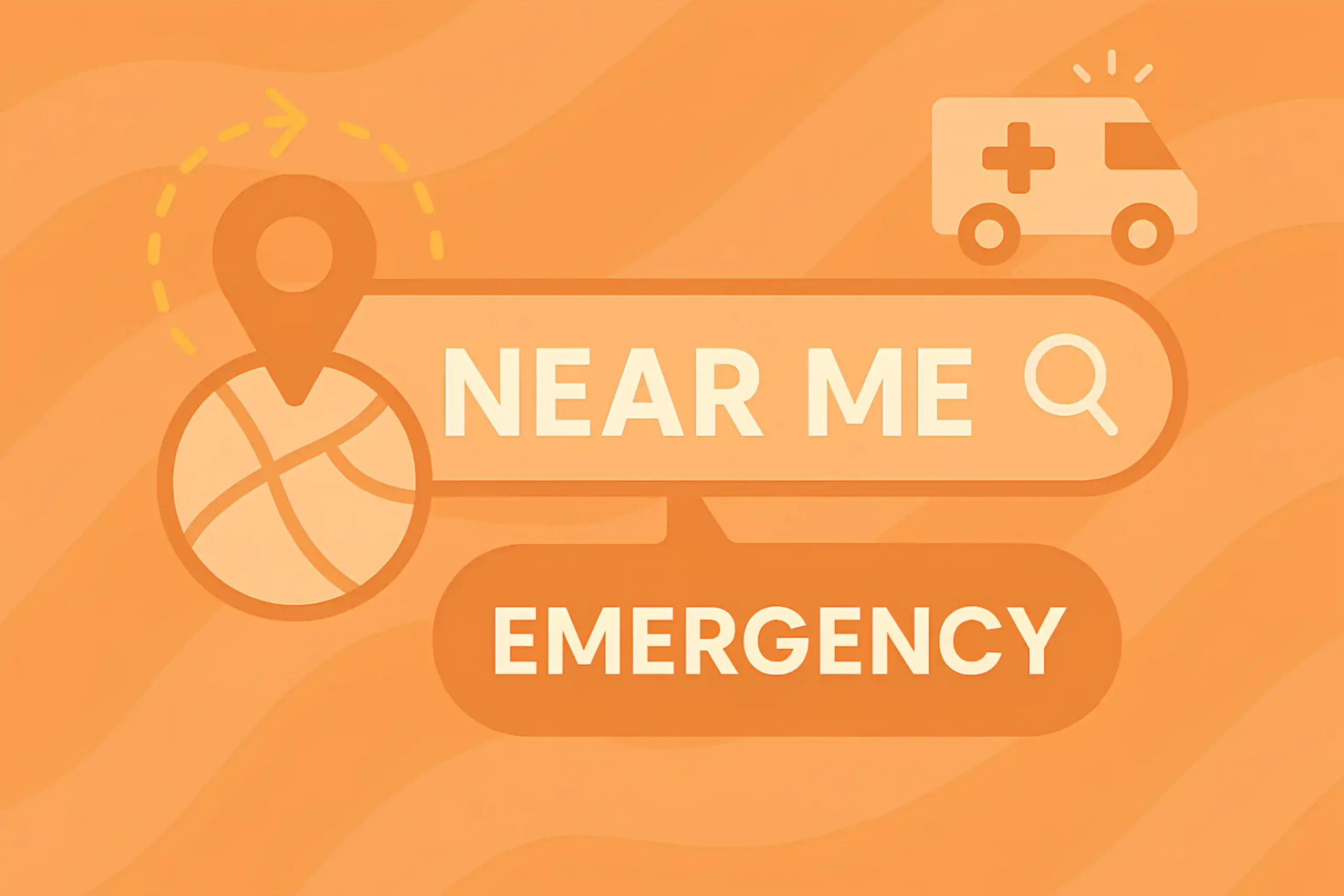
For example, if you’re optimizing for a national addiction treatment center that has clinics in Miami, Austin, and Denver, there’s no reason you shouldn’t build location-specific pages or blog content around “rehab near me” or “alcohol detox emergency help in [city].”
Sometimes people don’t include a specific city or state with their keyword, and it becomes hard to figure out where the “near me” is referring to. In cases like that, you can use Google Trends to see which cities or states have the most demand for that “near me” keyword.
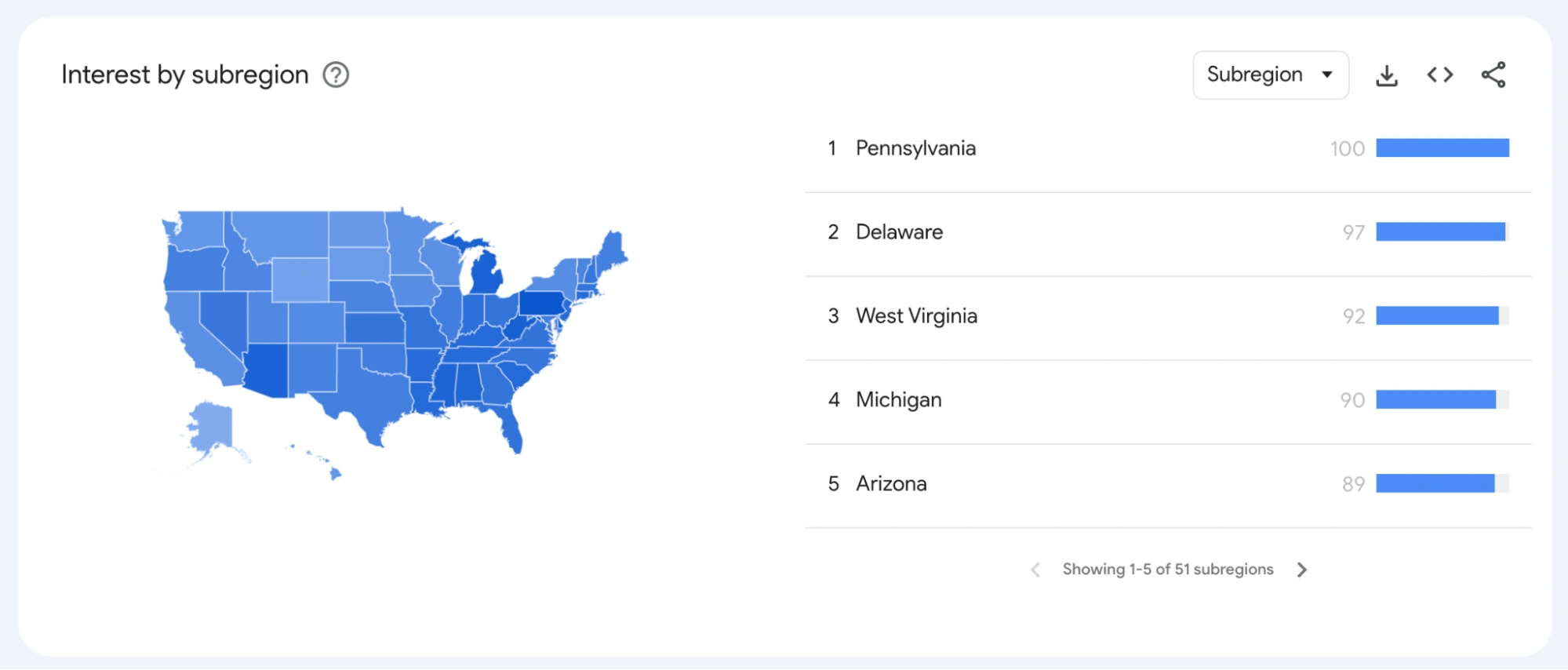
There’s another tactic I really like, and while it takes a bit of technical setup, it’s 100% worth it if you want to dominate “near me” searches. So, you create a landing page that directly targets something like “urgent care near me” or “pediatric dentist near me.” But instead of just stuffing in keywords or using generic content, you build it with real value.
Add a strong intro, include some FAQs or blog-style info to keep it engaging, and embed a dynamic Google Map that’s powered by their geolocation.

Basically, when someone searches for “emergency clinic near me,” Google takes their IP or mobile location, and the map shows them the closest branch or office you have.
I use the same strategy myself for my SEO business. I built a page around “SEO agency near me” and added useful info about choosing the right agency, common questions, and results to expect: all wrapped in natural, helpful content. Then I embedded a live map that adapts to the user’s location.
It’s not hard if you find someone who knows how to work with the Google Maps API or your CMS supports location-aware embeds.
7. Build Authority With Medical Backlinks
I always say it again and again; healthcare link-building is from a different planet. You just can’t compare it to other industries. The stakes are higher, the regulations are tighter, and the trust factor is everything. In most industries, you can build a decent backlink profile with general content, roundups, or even guest posts on broad lifestyle blogs.
However, in healthcare, if you’re not getting links from medical-specific or highly trusted sources, don’t expect your rankings to move much, especially for competitive health terms.

Believe me, I’ve tested just about every link-building strategy under the sun, from skyscraper technique to niche edits. But if I had to recommend one that consistently gets results in the healthcare space, it’s HARO link-building. It’s one of the best ways to earn real, powerful backlinks from high-authority sources.
I’ve personally helped clients earn links from sites like Healthline, MedicalNewsToday, and dozens of other relevant, high-traffic medical platforms.
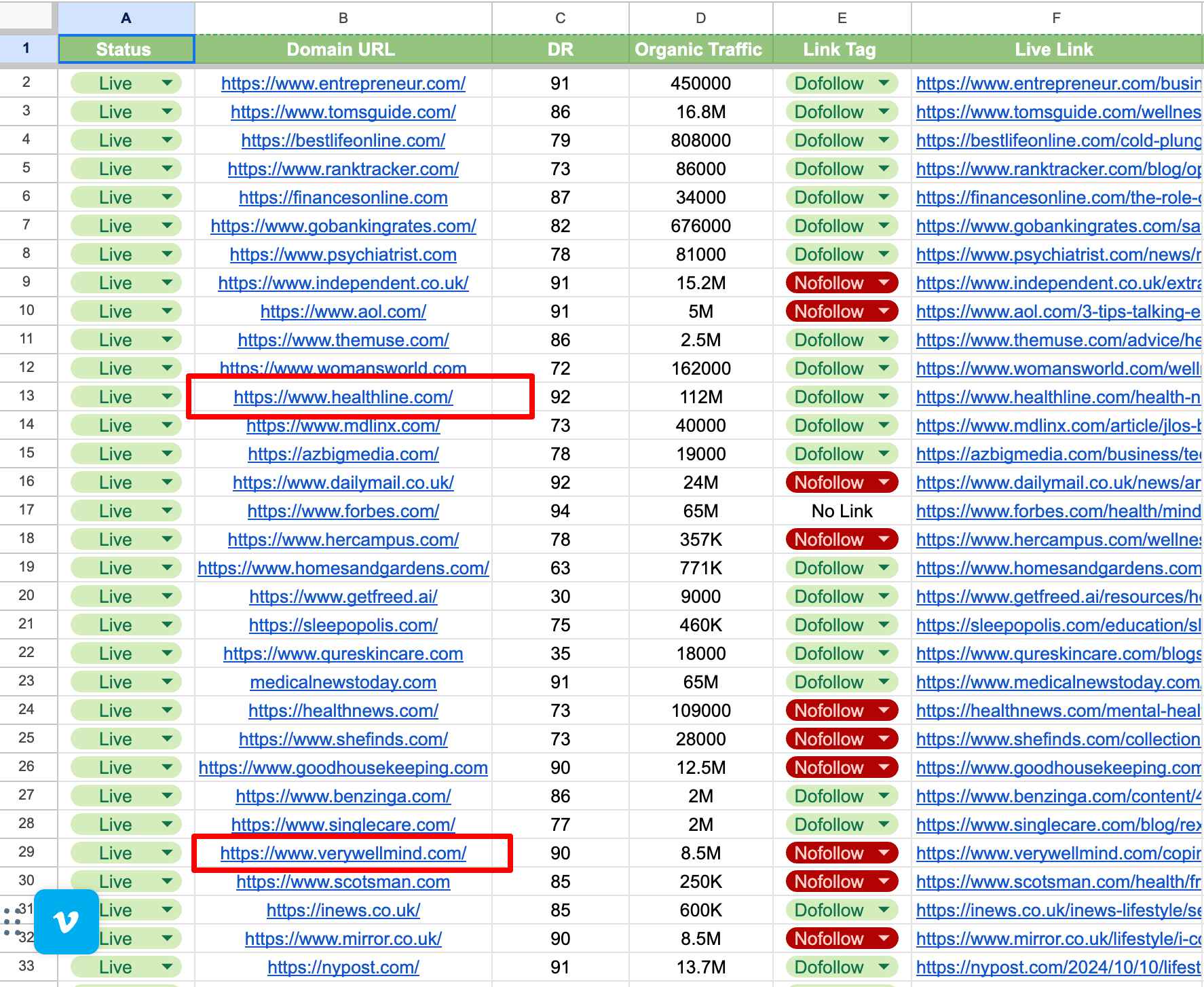
You can also create linkable assets. I’m talking about well-researched, insightful content that medical writers, journalists, and even universities would be happy to reference. That kind of content works around the clock for you. No link-building outreach, no deals, just natural, earned backlinks.
In healthcare SEO, you’re not going to buy your way into the top with a bunch of random backlinks. Most link sellers can’t even get you into the right niche, let alone high DA health domains. If you want links that matter, you need to earn them through digital PR, data-based studies, expert interviews, or anything that gives people a real reason to link.
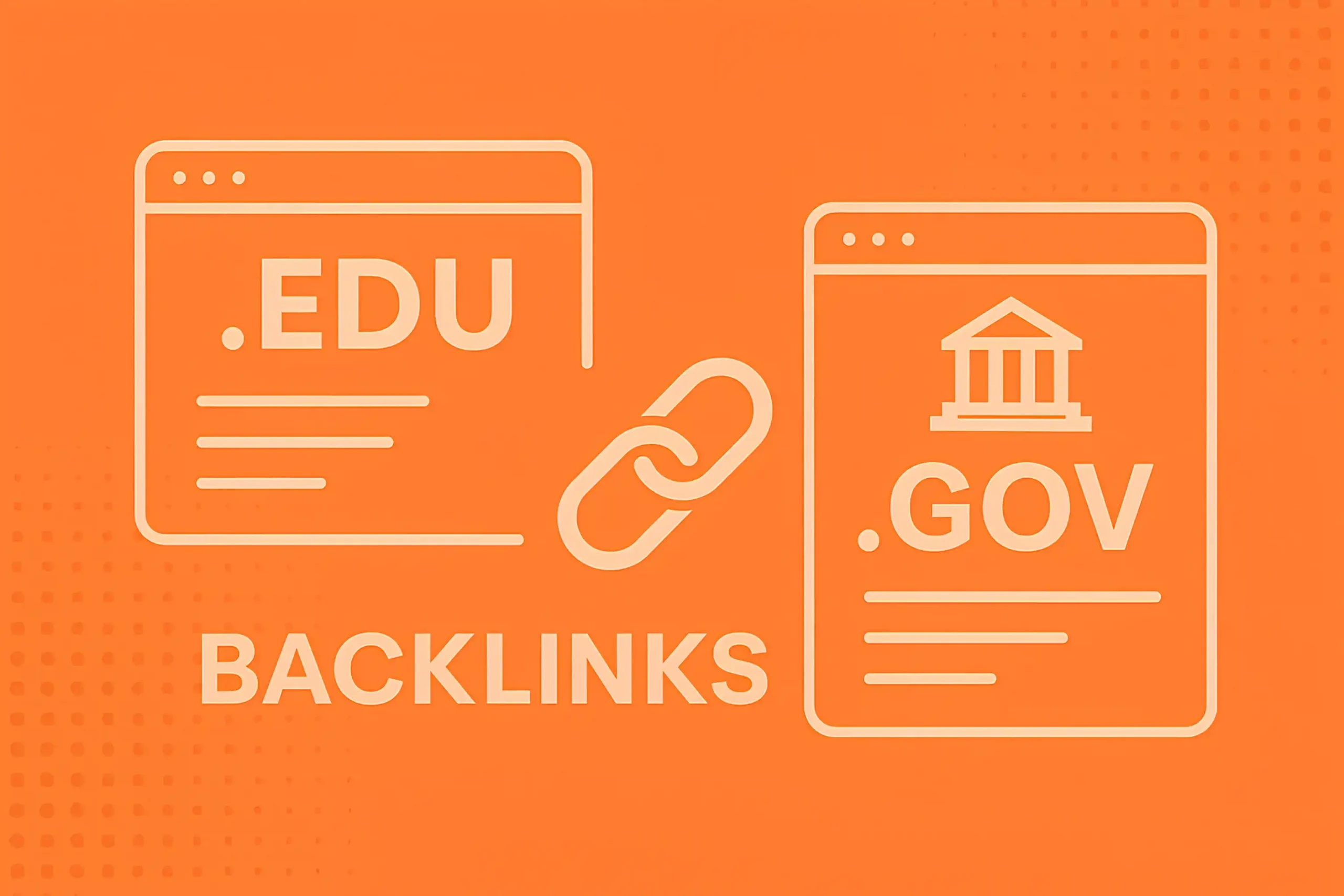
I would also say that .edu and .gov backlinks still hold serious weight, especially in healthcare. If you can create valuable content that appeals to universities or government health departments, that would be amazing.
For local clinics or medical practices, partnering with nearby institutions or offering to contribute to health-related resources can sometimes lead to those rare, hard-to-get links.
If you’re servicing local areas, local link-building strategies are another opportunity. Local directories, health-related event sponsorships, or collaborations with nearby organizations can get you highly relevant links and visibility in your target region.
If you’re new to link-building, I recommend checking out our complete A-to-Z guide, which covers everything you need to know to get started the right way.
8. Create Physician Bio Pages Optimized for Expertise
After the latest Google updates, it’s become even clearer that if you’re working in healthcare, you can’t ignore E-E-A-T. Google wants to know who is behind the content, and whether that person knows what they’re talking about. Healthcare, by the way, falls under the YMYL category, “Your Money or Your Life”, which means if you’re publishing medical advice or anything that could affect someone’s health, Google’s standards are higher than ever.
One of the best ways to build that trust is by having proper bio pages for your doctors, authors, or anyone who reviews your content. I mean an actual page that says who the person is, what they do, where they work, and why we should trust them.

For example, if the doctor has 10 years of experience in dermatology, write that. If they’ve been featured in other health sites or journals, mention it. Add a normal photo. No stock photos. Also, link the bio page to every article they’ve worked on. Then, link those articles back to their bio.
Here is an example:
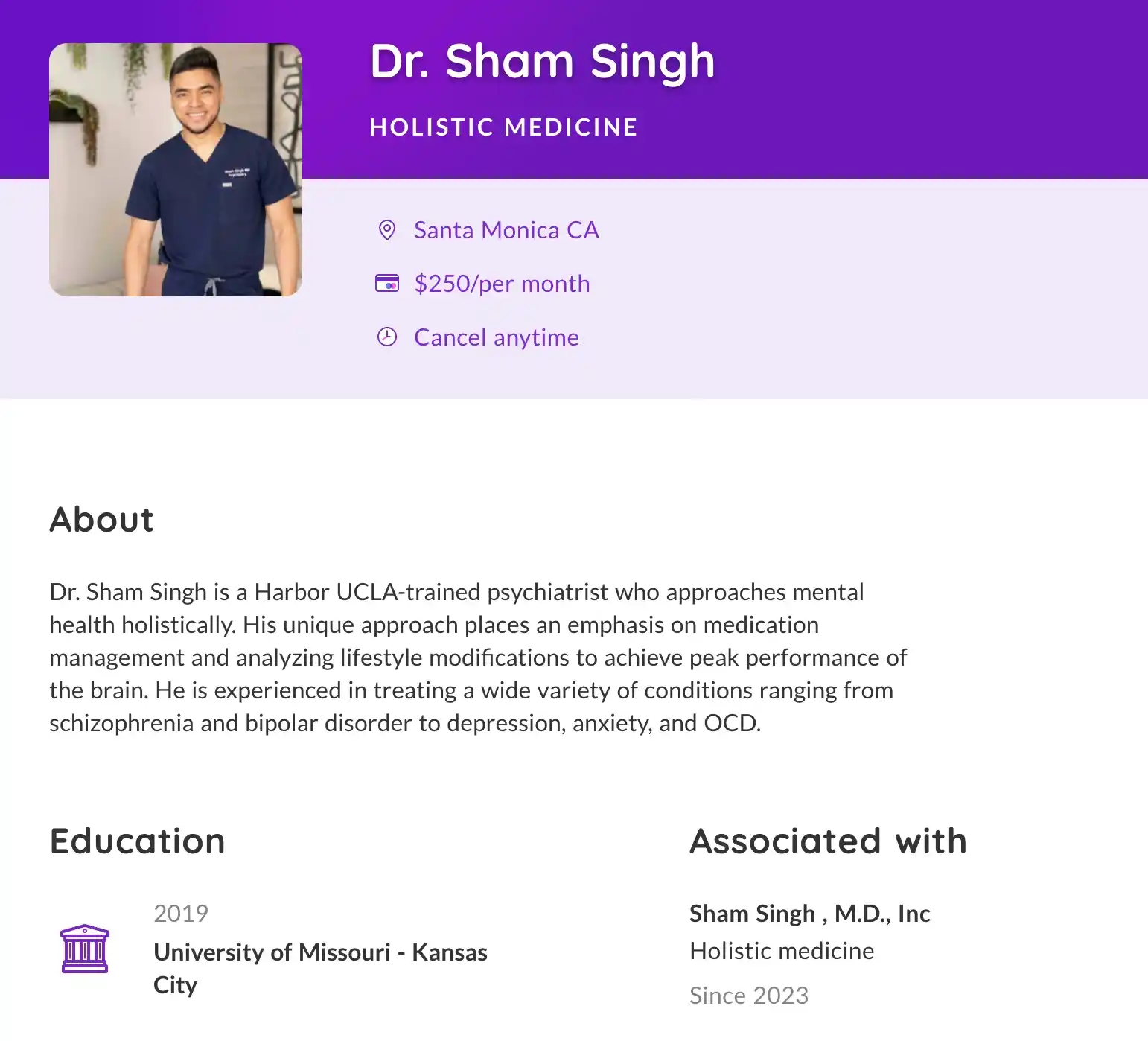
Some people write bios that sound like resumes. Others leave them outdated, still showing old job titles or clinics that the doctor left years ago. Avoid that!
Keep the language natural. Imagine you’re introducing the doctor to someone in person. That’s how the bio should feel. Short, clear, honest.
9. Optimize for Medical Appointment Intent Keywords
Many clinics try to rank for broad terms like “dermatologist” or “ENT specialist,” thinking traffic is traffic. But sometimes, ranking for those keywords might bring some impressions, maybe a few clicks, but not people ready to book an appointment.
The people who book are the ones typing in things like “book ENT appointment online” or “walk-in pediatrician near me (like you target in your Google Ads campaigns). They already know what they want. Your site just needs to appear and make it easy for them.

These are the money keywords. You can create individual pages or sections for specific services, like “same-day cardiology appointments in Miami” or “telehealth consults for migraines,” and match the language people use when they’re in a hurry or feeling sick.
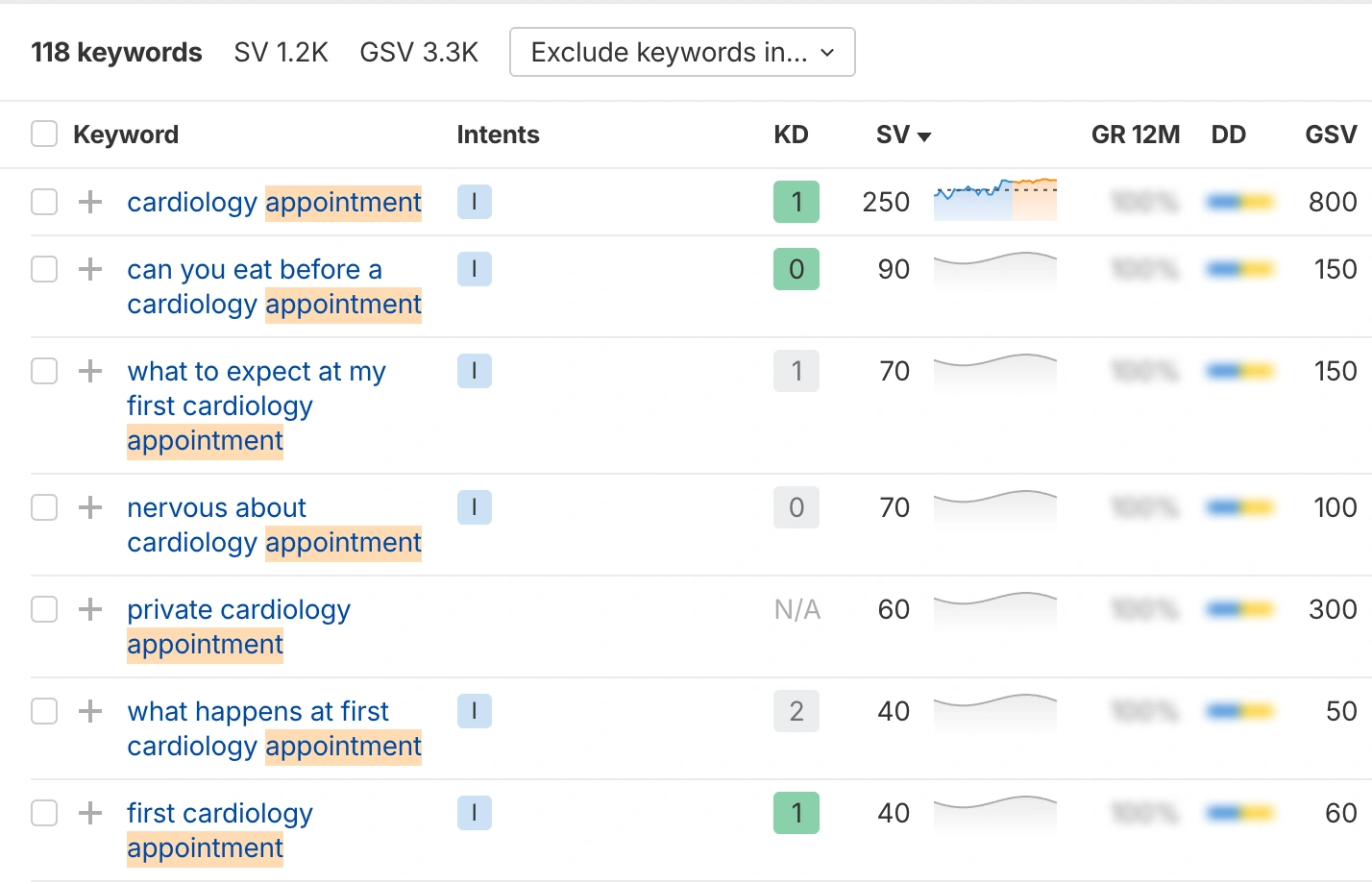
The page needs to look like it’s built for quick action. If someone’s typing “book now,” they shouldn’t have to scroll past paragraphs of AI-generated content. Put the booking form up top. Make the call button obvious. If you’re using forms, make sure they’re short and HIPAA-safe; nobody wants to type their entire medical history on their phone.
Keep the page fast. No dozens of pop-ups or sliders. If it’s a walk-in clinic, say it clearly, right at the top. Always include clear service areas. Saying “accepting new patients in Austin” does more than you’d think; it helps Google, and it reassures the visitor they’re in the right place.
10. Leverage Patient FAQs as Structured Content
In my opinion, this is one of those things people overlook, but it works ridiculously well. If you run a clinic or any kind of healthcare site, you need to be answering patient questions, not the generic textbook stuff, I mean, real questions people ask online.
For example, let’s go to Ahrefs, type “root canal recovery” or something similar, and just filter by questions. Next, let’s go to “questions keywords”
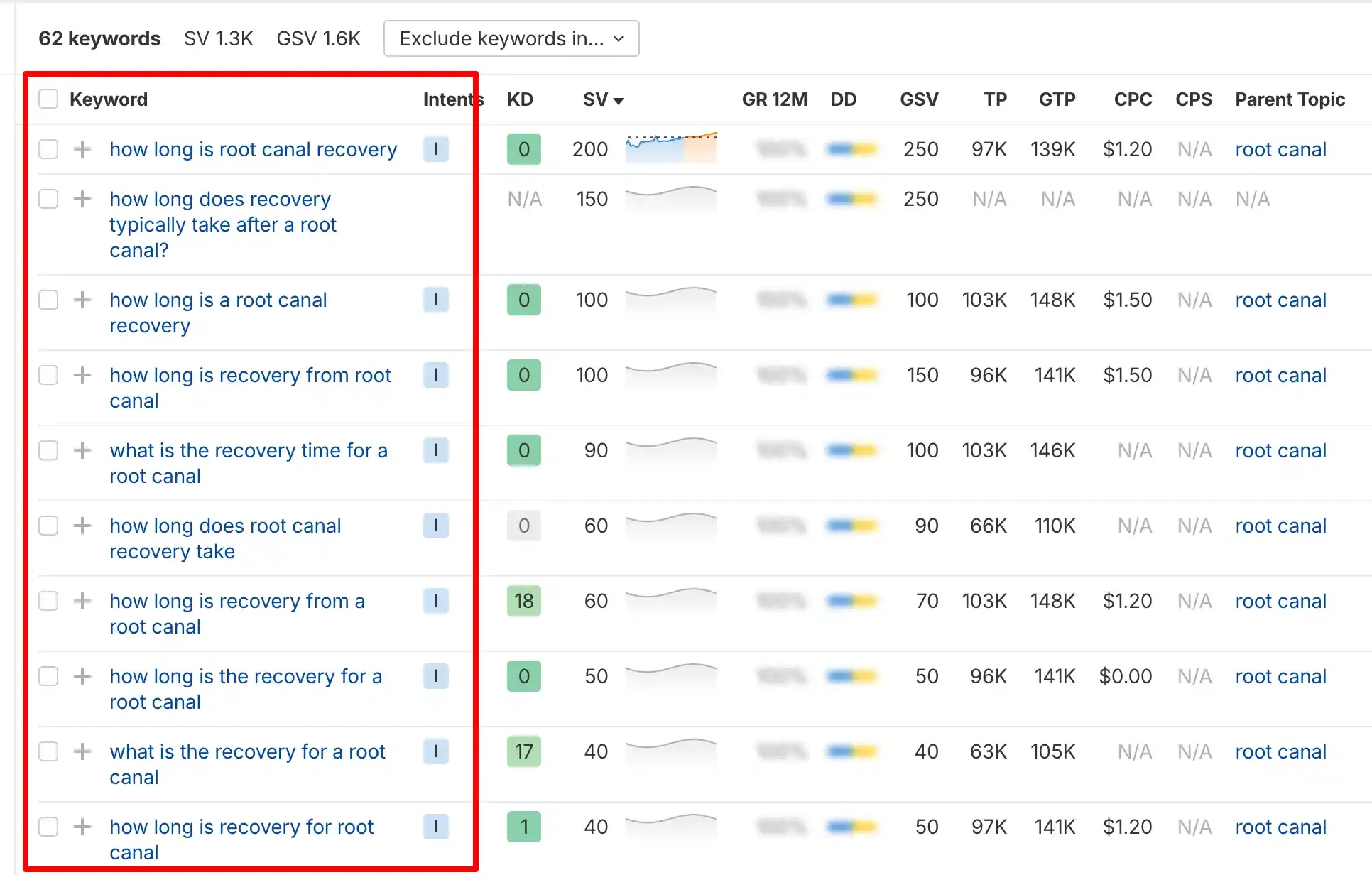
Then I start scanning for anything that sounds like a real person typed it. Things like “How long does it take to recover after a root canal?” or “Can I eat pizza after getting braces?” You’d be surprised how easy it is to rank for these. A lot of the time, no one’s written a proper answer. It’s usually forums or some thin content from years ago.
But, I don’t stop there. I go look at Reddit, Quora, and even YouTube comments sometimes.

Especially for stuff that’s personal, post-surgery, chronic pain, and cosmetic treatments. That’s where you see what people worry about. Tools can’t show you that. Forums are raw. You’ll get questions that never appear in keyword research tools but clearly matter to people.
As for where to put these FAQs, don’t just stuff them at the bottom of the page and forget about them. I like using them in the content itself. Like, let’s say you’ve got a page about “dental implants.” Drop a couple of questions mid-way through the content, right where someone might pause and think, “Wait, how painful is this actually?” You can also build full FAQ sections, especially if you’re using schema to help Google understand the structure.

If you’re just starting, go after the stuff people search for when they’re almost ready. Not “What is Invisalign,” but more like “Does Invisalign hurt the first week?” or “How do I clean Invisalign trays at night?” Those are people who are already shopping. Don’t waste time answering the stuff you can find on WebMD, it doesn’t bring patients.
Every FAQ our doctors answer, they write it like someone is sitting across from them in the clinic asking that exact question. Keep it real, don’t over-explain, and make sure it’s actually helpful.
11. Seasonal Health Campaign Pages
Every year, without fail, the same health topics pop up at specific times. Spring allergies, summer heatstroke, flu shots in the fall, and mental health around the holidays. People don’t Google this stuff randomly; they do it when it starts affecting their lives. So why wouldn’t your website meet them right there?
Finding such ideas is easy if you just pay attention. Look at what happened last year, what were people asking your clinic, your support tickets, and your front desk? Even your social comments can provide some ideas.
You just need to notice what happens every year and be ready for it.
What do you do with these pages after the season passes? Don’t delete them. Seriously, stop deleting pages that generated traffic. I keep them live, maybe update the dates or the content when the season rolls back around. That way, they’ve already got some history with Google. They’re warmed up and ready to go again.
These pages often rank faster than evergreen ones because Google knows there’s a rush of interest around that topic.
But what’s my process?
First, I always start with Google Trends. It’s free, and it shows you exactly when people start searching for certain health topics. You can type in things like “flu symptoms,” “allergy relief,” or “heat rash” and see when those terms are getting some popularity during the year. Even better, compare a few terms side by side and spot the seasonality patterns.
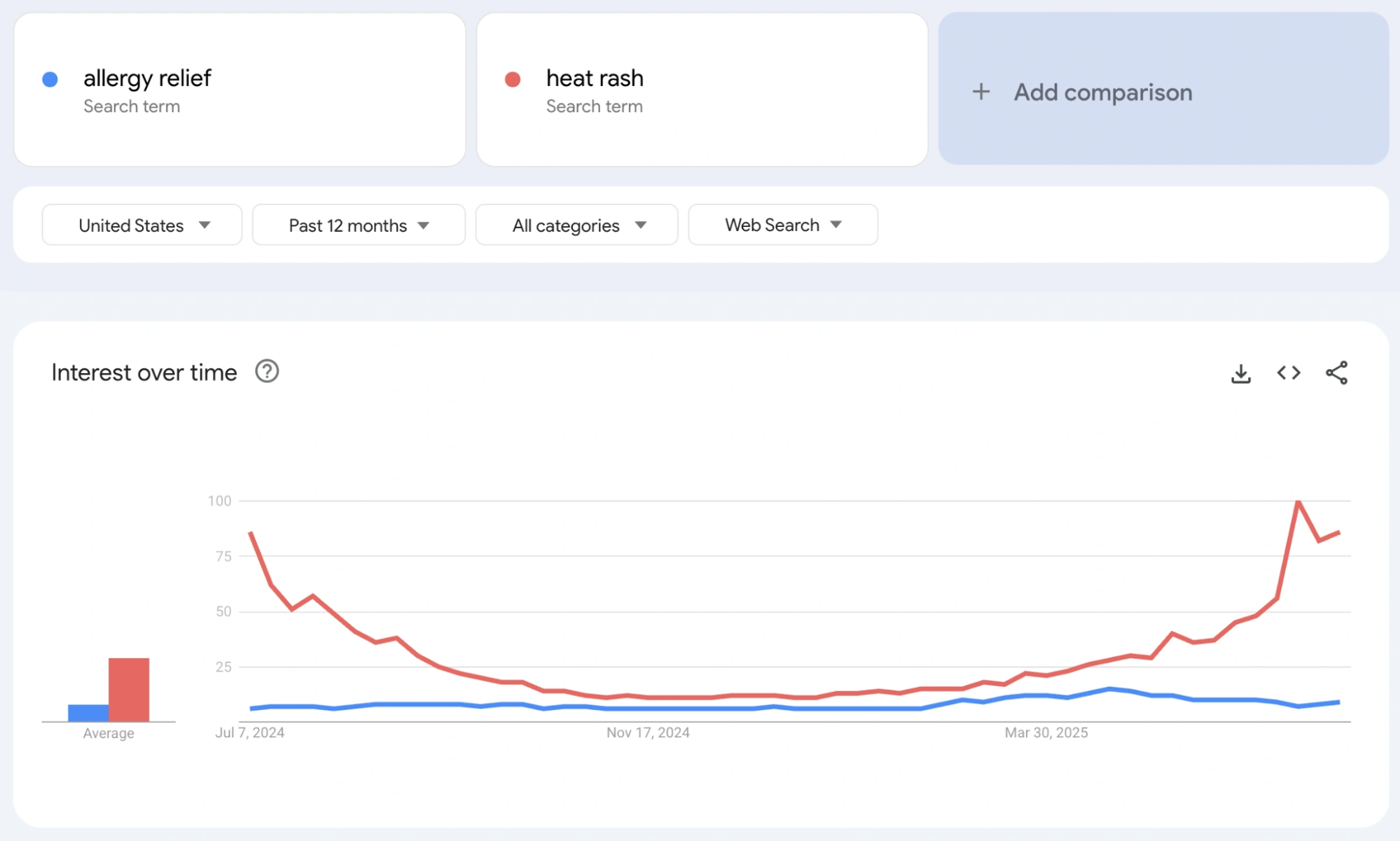
Next, I use Search Console if I already have an existing site with some traffic. You’d be surprised how many seasonal patterns are hiding in your own data. Just filter impressions by date and look back month by month. For example, if you had a “tick bite treatment” blog post that randomly jumped in traffic last May, that’s your clue to optimize it again this April.
Finally, go to a few high-authority health sites, check their blogs, and scroll back a year or two. See what they publish in March, in August, in December. If they’re consistently pushing out certain types of content at the same time every year, trust me, there’s a reason.
I also like using tools like Exploding Topics, Answer the Public, or Semrush’s Keyword Magic Tool, but I use them more for inspiration than answers.
Once I spot a seasonal keyword that’s showing a pattern, I plan content around it 4–6 weeks before the peak, that way I give Google time to crawl and index my pages, and I don’t miss the opportunity.
12. Build Medical Glossary Pages for Patient Education
If you run a healthcare site, at some point, you’ve probably thought, “Should this be a blog post or just a short explanation?” Here’s how I think about it: if someone’s just trying to figure out what something means, like “What is an EEG?” or “COPD meaning”, that’s not a blog post. That’s a glossary page. Don’t overcomplicate it.
They’re not looking for tips, personal stories, or treatments. They just want to understand the term. A blog post is more like, “What to expect during an EEG test” or “How to manage COPD naturally.”

Finding good glossary topics isn’t hard. Just open Ahrefs or Semrush, type in something broad like “cholesterol” or “MRI,” and look for keyword variations with phrases like “what is,” “meaning,” or “define.” You’ll start to see patterns: short, factual searches that show clear intent.
If Google’s ranking WebMD, Mayo Clinic, or Cleveland Clinic glossary-style pages for that keyword, it’s a safe bet.
No need to write 500 words. I usually keep it short and to the point: a clear definition in simple words, maybe mention when the term appears in life (like during a diagnosis or treatment), and then link to related services or blog posts. That’s it. Glossary pages help build topical depth, keep users on the site longer, and generate tons of long-tail traffic over time.
13. Use Real Case Studies and Testimonials
People trust people, be it in healthcare or dental SEO, that trust is everything, and I think real case studies and honest testimonials matter way more than some generic “we care about your health” type of copy. When you include real patient stories or results from actual procedures, time on page goes up, bounce rate drops, and conversions improve.

You don’t need PDF case studies or overproduced video testimonials. Just start small. A short paragraph about how a patient went from X to Y or a real quote from someone who had a great experience. Even better if you add a name and photo, with permission, of course. It makes a huge difference. Faceless reviews don’t build trust, especially in health-related services where emotions are already high.
In terms of SEO, these pages generate traffic too. When people search for things like “veneers before and after,” “dental implants recovery stories,” or “does teeth whitening work,” they’re not looking for textbook answers; they’re looking for someone who’s already gone through it. If your site offers that, you’ve got their attention.
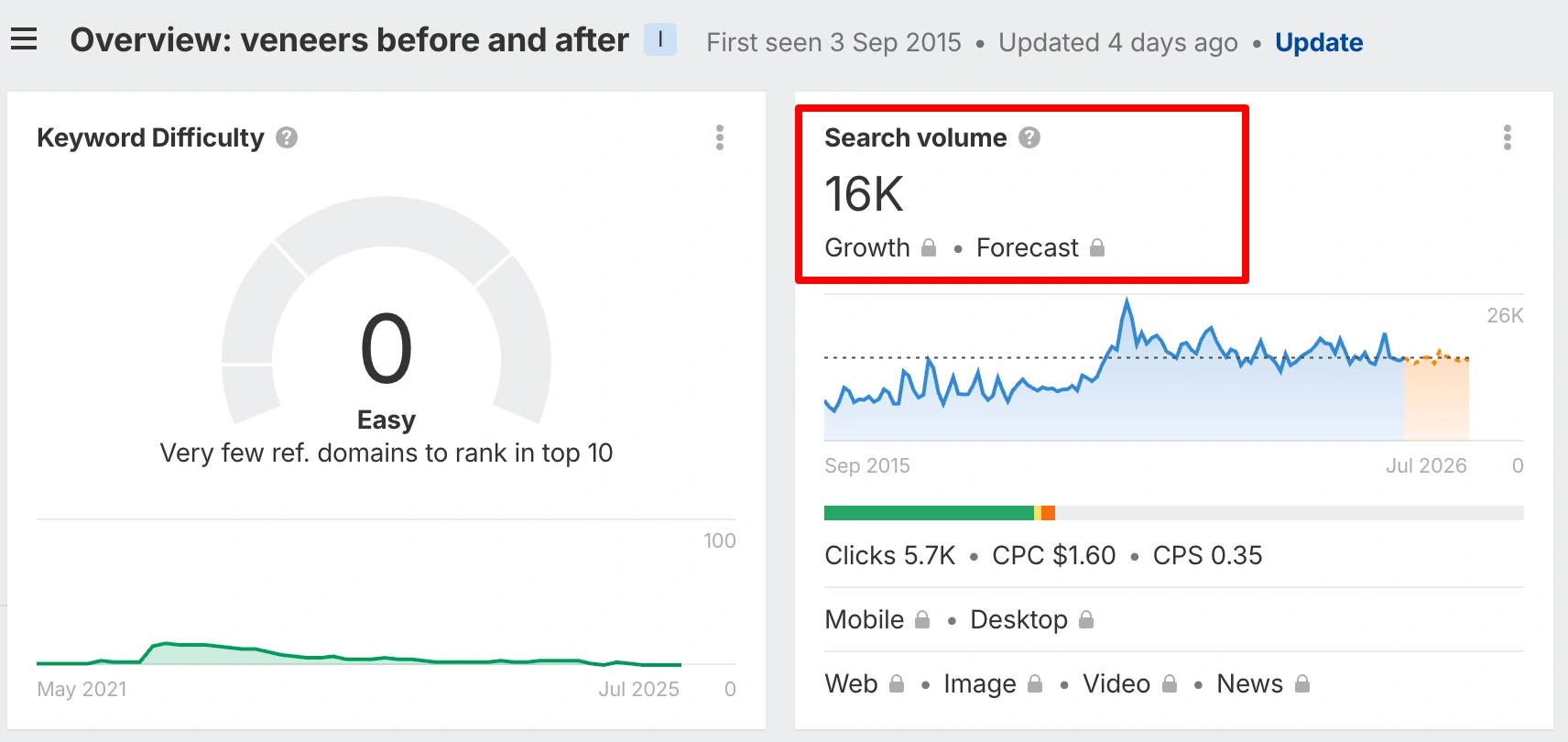
Try to create a dedicated page for success stories, or even use them across relevant service pages. Make it natural and use real language. You can also turn successful cases into blog content, break it down: what the issue was, how you handled it, what the outcome looked like. It’s informative, helpful, and builds both credibility and topical relevance.
Remember, in healthcare SEO, trust is your biggest ranking factor, even if Google doesn’t call it that.
14. Publish Authoritative Medical Content with Verified Review
In the healthcare industry, “good enough” content isn’t enough. People want to know who wrote it, who checked it, and whether it’s even accurate. Would you take advice on a heart condition from a blog with no author, no credentials, and no review date? Probably not. Neither would Google.

Publishing medical content without expert review is like opening a clinic without licensed staff. You can have the cleanest design, fastest load time, and perfect keyword targeting, but if the content sounds generic, dated, or questionable, it’s not helping anyone.
I’m not saying every blog post needs to be written by a doctor. But it should at least look like someone credible has been involved. That means having a real author with credentials, a medical reviewer if possible, and a clear last-reviewed date.
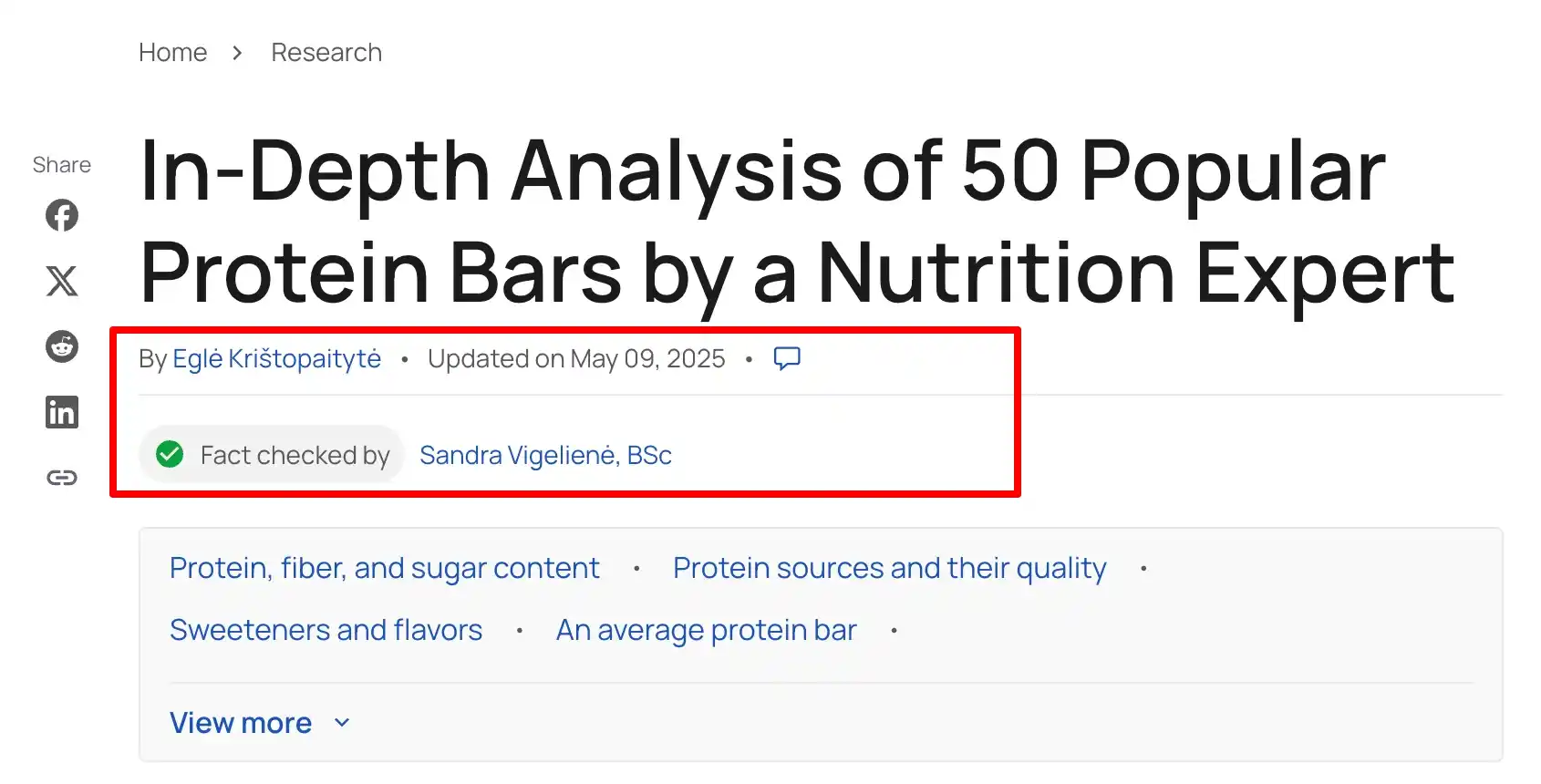
Add a short bio at the bottom of the page. Link to their professional profile or license.
Take your older blog posts and run them by a medical reviewer. Once it’s reviewed, update the publish date, add the reviewer’s name and bio, and submit it for reindexing. It’s one of the easiest ways to boost authority without creating new content from scratch.
Advanced Local SEO Tips for Healthcare Providers
If you’re treating patients at a physical location, then every online signal, from your site’s structure to third-party mentions, needs to highlight where you are, what you do, and who you help. That means beyond the basic NAP consistency, your local authority must look and feel organic but extremely intentional.
Ready to dive into the kind of tips I usually share during $250/hour SEO coaching sessions?
First things first, build supporting internal content around hyperlocal micro-areas within your service zone (e.g., ZIP codes, neighborhood names).
For example, instead of just “Pediatrician in Miami,” build content around “Pediatric Care Near Coral Gables, FL” or “Child Wellness Services Near 33143.” Then, pair all pages with internal links pointing back to your main service pages.
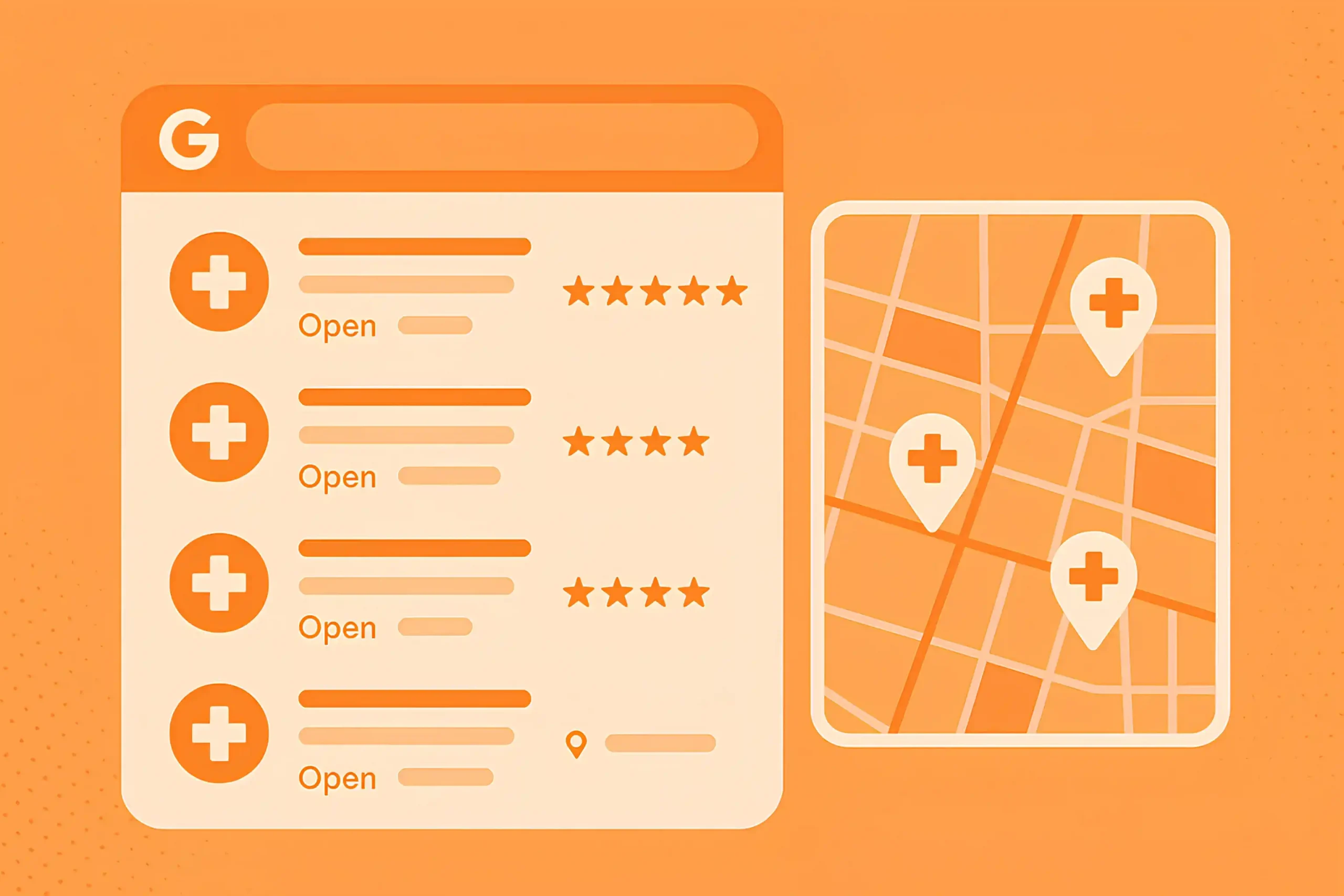
Here’s another powerful technique we typically include in our local SEO packages. Instead of creating location pages for your main service, try creating them for each specific service you offer in that location.
Let’s say you run a physical therapy clinic. Most people target a page like “Physical Therapy in Miami.” That’s okay, but it’s not enough if you really want to compete.
Create separate pages like:
- “Post-Surgery Physical Therapy in Miami”
- “Sports Injury Rehab in Miami”
- “Stroke Recovery Therapy in Miami”
If you build these pages using a programmatic setup (like with Webflow CMS or WordPress templates), you can create dozens of pages quickly, without writing each one from scratch. Just make sure the content still sounds human and includes location details (like neighborhood names or local landmarks) so it doesn’t feel copy-pasted.
By the way, I have a detailed guide on how to do programmatic SEO using Webflow. It breaks down the full process step-by-step, so you can build scalable, localized pages without losing control over content quality. Worth a read if you’re planning to go this route.
Finally, you can also generate localized patient FAQs based on common queries. For example, you can pick real patient questions from local Google Q&A, Reddit, or even your front desk logs. Then create location-based FAQ blocks on your pages, using Schema markup, that show how actual people in your area talk.
Example:
“Is physical therapy covered by insurance in Tampa?”
“Do I need a referral for dermatology in Oregon?”
I’m sure this is another effective way to create trust, boost topical relevance, and generate long-tail search traffic from questions that almost no competitors are answering directly.
If you’re considering outsourcing your local SEO or working with an experienced
SEO for Private Healthcare Providers and B2B Healthcare Companies
If you’re selling medical software, diagnostic tools, or hospital equipment, let me change the game a little. Let’s say you sell ultrasound machines. Don’t just create one page called “Ultrasound Machines.” Instead, make separate pages for each type, like one for portable ultrasounds, another for 3D ones, and another for handheld versions.
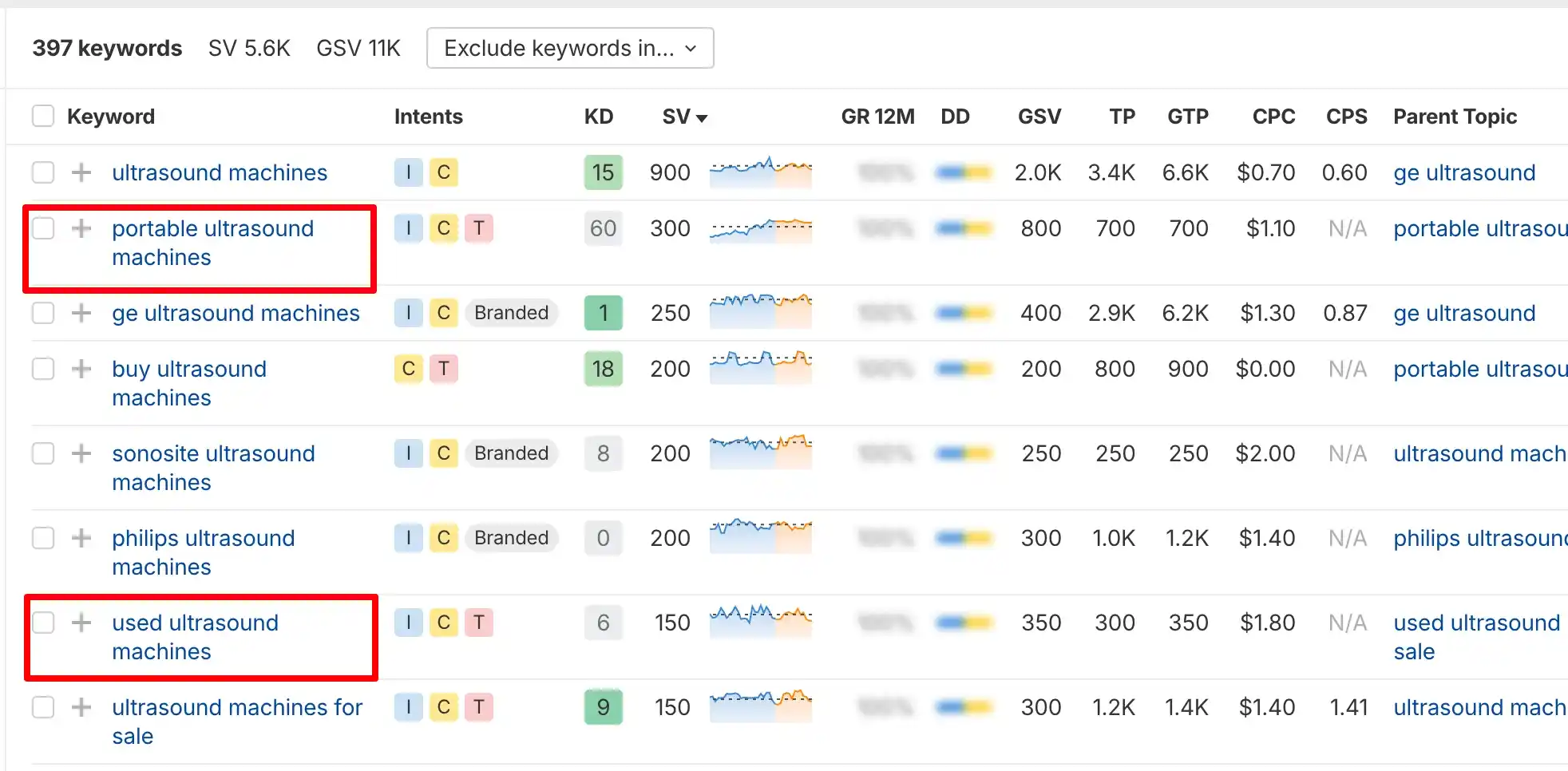
Then go even further. Make pages based on who’s buying, for example, “Ultrasound for Small Clinics” or “Portable Ultrasound for Emergency Rooms.” When you do this, Google is more likely to send the right visitors to the right page, and those visitors are more likely to become your customers.
Remember, not everyone who visits your site is ready to take out their wallet. Some are just doing research. So, you can also write helpful blog posts like “How to Pick the Best Portable Ultrasound for a Small Clinic” or “Top Diagnostic Tools for Rural Hospitals.” If you give people helpful info when they’re still deciding, they’re more likely to trust you and come back when they’re ready to buy.
Private Clinic SEO with Focus on High-Value Services
Anyway, I decided to separate this part under a subheading to emphasize its importance. So, let’s move ahead. Some services, like plastic surgery, IVF, or private cancer care, are high-ticket. So the SEO strategy needs to go beyond just traffic; it should focus on attracting people who are ready to spend.
I think in this scenario, people researching private options are worried about pricing, process, success rate, and trust. If you’re offering IVF, don’t just write a “Private IVF Clinic” page. Create additional pages like “How Much Does IVF Cost in [City]” or “Private IVF vs NHS IVF: What’s the Difference?” These convert better because they match the reader’s real thoughts.
Add before/after galleries, videos, and doctor bios.
Especially in fields like plastic surgery, people want to see proof and feel safe. So, it’s a good idea adding reviews, stories, or even a “Meet Your Surgeon” section to make it personal.
One more thing, target location and intent together: instead of just “IVF London,” try building a page like “Affordable IVF for Over 35 in London” or “Best IVF Clinic in London for Second Attempts.
SEO for B2B Healthcare Marketplaces or SaaS Platforms
I don’t even remember how many times I’ve said B2B SEO is one of my favorites, and of course, I couldn’t skip the chance to drop some killer tips for the healthcare sector. So, if your platform connects doctors with suppliers or manages appointments, your SEO has two sides: the service and the audience.
First, go after use-case pages. For instance, if you’re a platform that helps clinics manage their schedule, don’t just have a homepage that says “Clinic Software.” Make pages like “Appointment Booking Software for Dermatologists,” “Scheduling Platform for IVF Clinics,” etc.
Still hungry? Here is another killer SEO + PPC combination that works really well, especially for healthcare SaaS.
Let’s say your software competes with something like Athenahealth. You can craft a comparison blog post like “Athenahealth vs [X Brand]: Which Healthcare Software Fits Better for Small Clinics?” to naturally attract searchers who are actively comparing options (BOFU).

Once they visit that page, retarget them with Google Ads. You already know they’re interested. Show them customized ads like “See Why Clinics Are Switching from Athenahealth” or offer a free consultation/demo to tip them over the edge. I’m sure it will help you win visibility on Google and stay top-of-mind after they leave your site.
Ready to grow your healthcare SaaS with our SaaS SEO agency? Contact us today and let’s build something that drives signups.
Build Pages Around Buyer Personas in the B2B Funnel
You can’t talk to a hospital director the same way you’d talk to a local dentist. You might be trying to reach owners, doctors, finance teams, or operations managers; all of them care about different things. So, your SEO content has to be customized to match each person’s mindset. For instance, if you’re selling practice management software, one generic page won’t work for everyone.
Instead, create specific landing pages for each type of buyer:
One page for practice owners who care about growing their business and seeing long-term value.
One for finance teams who focus on ROI, budgeting, and cost-effectiveness.
Another for operations managers who care about how easy the system is to use and whether it’ll make day-to-day work smoother.
Each group has their own goals, pain points, and reasons to buy.
Sure, keywords are important, but people search in the form of questions. So instead of only targeting something like “clinic scheduling software,” write a blog post that answers something a buyer might type into Google, like:
“How do I reduce missed appointments in a small clinic?”
It’s coming from someone who’s dealing with a problem your product can solve. Once they visit your site, don’t forget to give them a helpful, downloadable resource (lead magnets).
The Role of Healthcare SEO Writers in Content Strategy
It’s not by chance that I’m bringing up the role of healthcare SEO writers in this post. I knew from the beginning that content writing deserved its own section. Right now, we’re living in a time where almost everyone’s providing AI SEO services, from keyword research to content outlines to full article generation.
You know, I understand. It’s fast, it’s cheap, it sounds pretty decent. But I’ve said this before, and I’ll say it again, healthcare is not the place to experiment. AI doesn’t know what it feels like to sit in a doctor’s chair, hear a diagnosis, or recover from a major surgery.

Whether you’re using AI to draft content or writing it manually like we’ve done for years, you need a real expert involved. Ideally, someone with a medical background: actual doctors, retired professionals, medical writers with clinical experience.
Please, don’t add fake doctor bios.
Google might index it, sure, but no serious reader (or patient) is going to trust it.
I know healthcare SEO writing services cost money, and getting a doctor to review content or even ghostwrite parts of it is expensive. I’ve worked with clients who had top-tier SEO consultants, solid technical foundations, and perfect internal linking, but content quality still held them back because they tried to save a few hundred dollars per article. It doesn’t work like that.
For example, according to Healthline’s editorial policy, every piece of medical content is reviewed by at least one professional with years of clinical experience. There’s a reason they generate over 200 million monthly visits.
So yeah, don’t outsource it to the cheapest writer you can find. Don’t rely fully on AI and think your job is done. If you’re in this industry, you’re playing a long game. SEO is one piece of it, but your words can affect someone’s health decisions.
How to Target the Right Healthcare SEO Keywords
The truth is, keyword research is keyword research. Whether you’re running SEO campaigns for dentists, SaaS, or real estate, the base techniques don’t change that much. You still start with seed terms, use tools like Ahrefs or Semrush, and look at search volume, difficulty, intent, all the usual stuff.
But for healthcare, things are a little different.

I always examine patient-first language (which is not possible with everyday tools). It’s better to spend half an hour on Reddit threads, health forums, or even reading real patient reviews, and you’ll start noticing patterns in how people talk about their symptoms or concerns.
For example, most people don’t search “malocclusion treatment options”, they’ll Google something like “my teeth don’t line up right” or “why is my jaw clicking.” That’s what you want to pay attention to.
Sometimes I also scan medical directories or doctor listing sites. Let’s say you’re doing SEO for a functional medicine clinic. Most people would just target the “functional medicine near me” keyword. But if you take the time to go through the services doctors offer: “chronic fatigue help,” “gut detox protocols,” “mold exposure treatment”, you will find hundreds of similar untapped ideas.
Remember, in healthcare, it’s usually the low-volume, long-tail stuff that generates leads. I’d rather rank #1 for “eczema treatment for toddlers Miami” than #12 for “eczema treatment.” Healthcare is one of the few industries where specific wins over broad almost every time.
So yeah, use your tools, but also use your head. If you just follow keyword metrics in this niche, you’ll miss the stuff that converts better.
Healthcare SEO Case Study (First-Hand Insights from an SEO Pro)
Back in 2022, a medical blog reached out to me through Upwork. Their main goal was pretty straightforward; they wanted to drive serious organic traffic over the next one to two years so they could start monetizing with affiliate offers. They already had an experienced content team in place, which helped a lot.
I came in to handle the content strategy and link-building side of things.
From the start, we were starting from zero. I mean literally zero, no traffic, barely any authority, no backlinks worth talking about.
So, we started focusing on trust.
They implemented almost everything I recommended in this healthcare SEO guide. For link-building, as I’ve talked about in my link-building case studies, HARO links played a big role.

We focused on E.E.A.T., producing content that was written by real writers and reviewed by real doctors. Everything looked clean, legit, and trustworthy, even the internal linking and page structure supported that credibility.
The most interesting part was that in the beginning, we went after about 100 very low-competition, informational long-tail keywords.
We ran them through Ahrefs and filtered by page-level DR, meaning that the top 10 SERP competitors ranking on page one had DR 15 or 20 max.
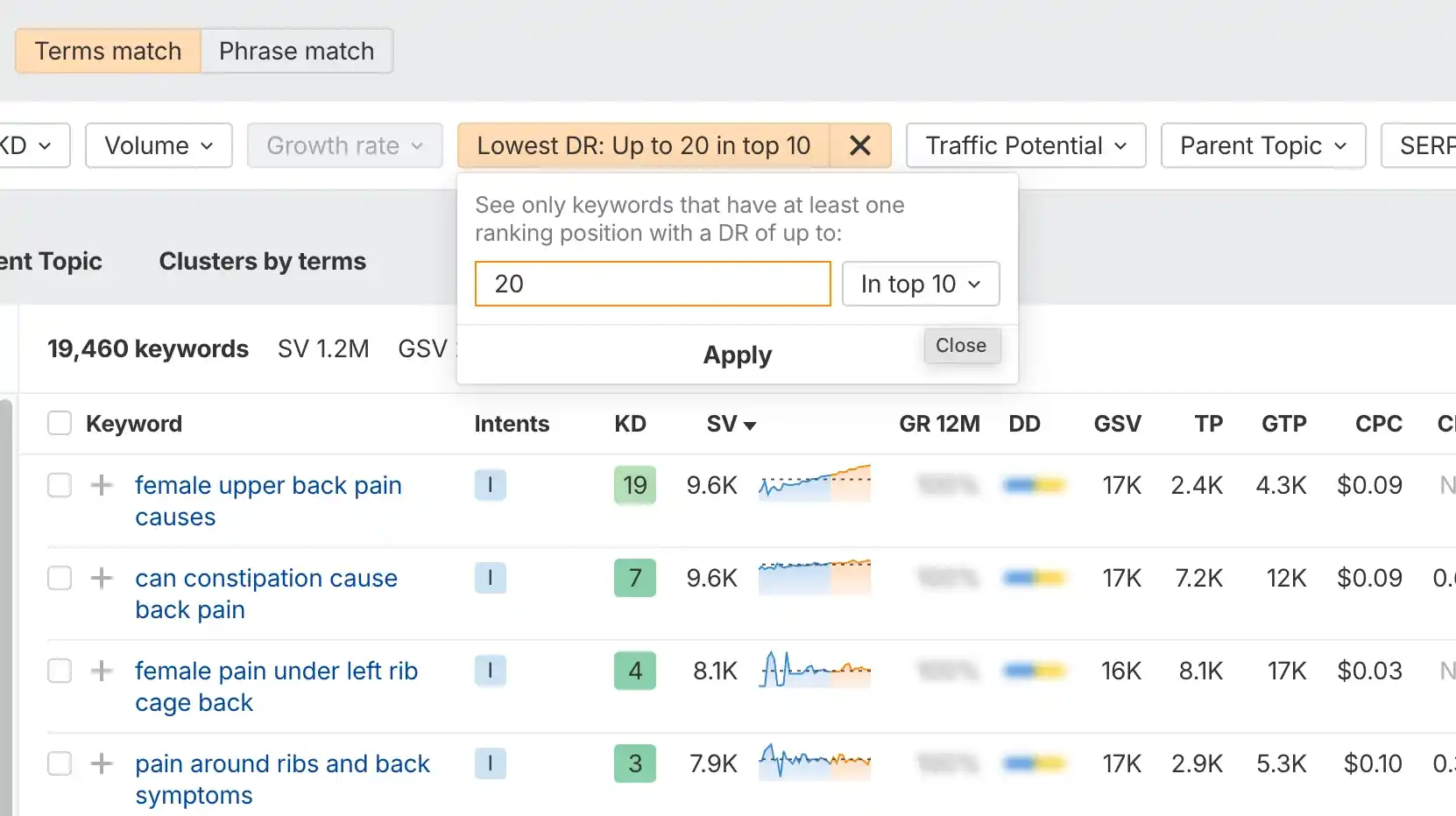
A few months in, the site was generating over 300,000 organic visits per month.
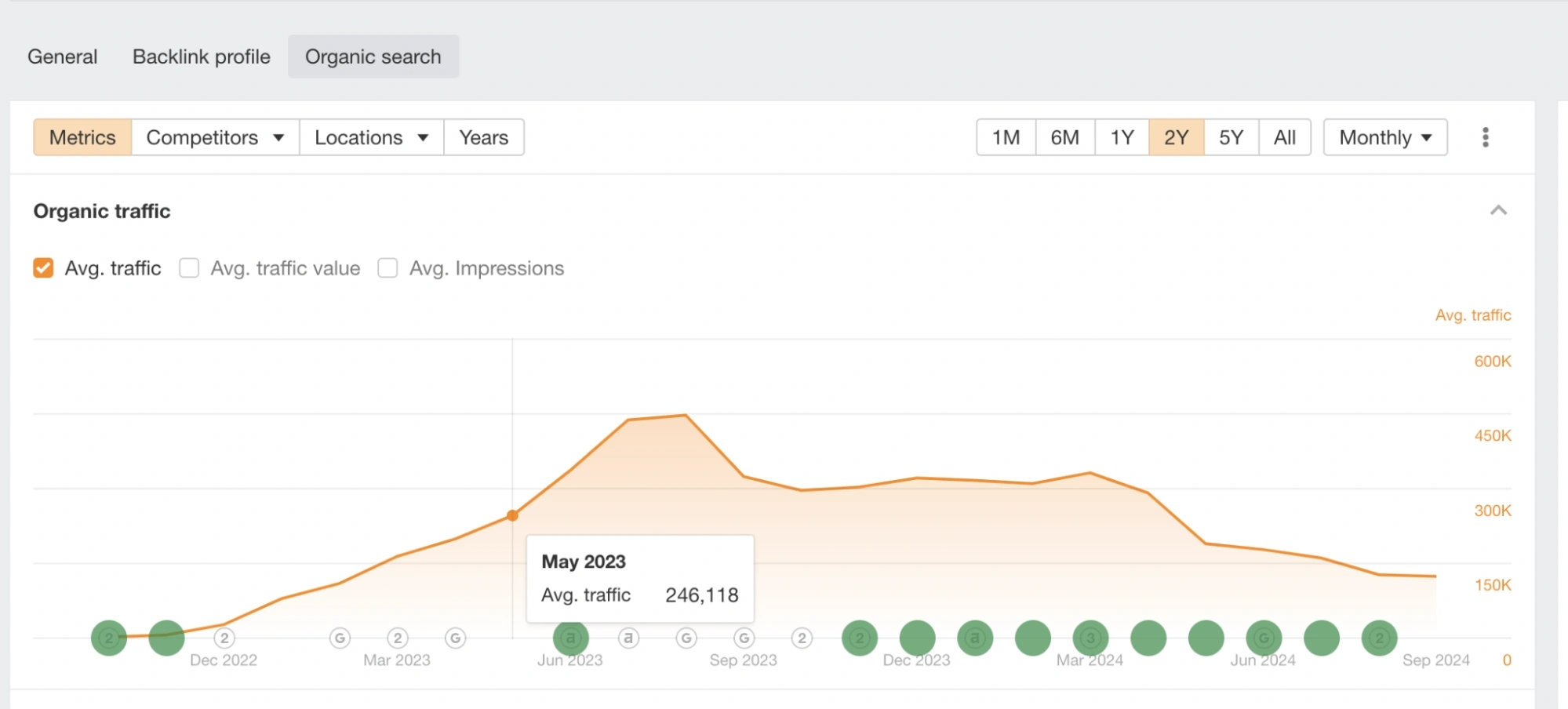
It scaled fast because we set up the foundation right. Lately, traffic has started dropping a bit, mostly because they’ve begun selling links, and that’s never a great long-term tactic.
The Cost of Healthcare SEO
Smaller practices can usually get started with $1,500 to $3,000 a month. Multi-location clinics fall somewhere between $3,000 to $7,000. Larger hospital systems or enterprise-level health brands typically need budgets north of $10,000 monthly, especially if they’re targeting aggressive growth.
I’ll admit, healthcare SEO is a bit more expensive than other sectors, primarily because the costs of link-building and content writing services are higher. But don’t blame anyone. I’ve worked with enough clients to tell you: healthcare SEO takes more effort because Google’s very strict with anything related to health.
If you want to dive deeper into how SEO pricing works and what you’re paying for, check out our complete guide.
So, should you outsource SEO or try to handle it in-house? That depends on where you are as a business. If you already have a marketing team with deep SEO experience, and you’re willing to hire specialized writers, analysts, and link-building specialists, doing it in-house might work.
But realistically, most healthcare companies don’t have that team already built, and starting from scratch is expensive. Probably, you’ll spend more trying to hire, train, and manage than if you work with an agency that knows and provides healthcare SEO services from day one.

The key is hiring an SEO agency with proven results in healthcare, not someone who just says they’ve “worked with medical companies” but can’t show outcomes.
As for pricing models, the best setup for healthcare is a monthly SEO retainer (IMO). One-off projects don’t work because SEO isn’t a one-time task. It’s a long game, and you need consistent work to see results. Retainers give your SEO team the time and flexibility to plan, test, adjust, and improve.
How to Choose the Right Healthcare SEO Agency or Consultant
Long story short: you need someone who understands how patients search, how Google treats medical content, and what it takes to build trust across search engines (Bing, Yahoo, not just Google). If they’ve only done SEO for B2B SaaS or eCommerce stores, that might not work.
Ask questions like: Have you worked with healthcare companies before? What kind of results did you get? Do you understand HIPAA, E-E-A-T, and medical content standards?

Ask for real case studies, not just “we improved traffic.” You must see what they did, how they did it, and what it meant for the business. Ask for references. If they’ve done good work, someone should be willing to vouch for them.
Before making a decision, compare SEO outsourcing vs in-house options. Hiring in-house means you have someone fully focused on your brand, but you’ll need to hire for multiple roles: content, links, strategy, and tech. That takes time and costs more than most expect.
Agencies already come with a full team and processes, so you get speed and expertise right away. But you still need to find an SEO agency that understands your field, not just SEO in general.
When you speak with potential agencies or consultants, don’t just listen to their technical talk. Ask questions. Why do they work in healthcare SEO? What do they enjoy about this industry? Do they care about results or just rankings? People who are passionate about their work will show it without any effort.
What’s the Ideal SEO Content Length for Healthcare Topics?
There’s no one-size-fits-all word count for healthcare SEO content (especially that word count is not a ranking factor, but generally, in-depth pages tend to perform better, especially in this industry where trust and detail matter.
For core service pages, try to craft at least 800 to 1,200 words. For educational blog posts or condition-specific guides, going up to 2,500–4,000 words can help you cover the topic thoroughly and signal expertise to users and search engines. But of course, quality always comes before quantity.
How Do I Know if My SEO Strategy Is HIPAA-Compliant?
To know if your SEO strategy is HIPAA-compliant, start by checking how you collect and handle any user information. If your website has contact forms, appointment requests, live chats, or any feature that collects protected health information (PHI), those tools must follow HIPAA standards.
You should also avoid using tracking tools like session recorders, certain analytics platforms, or ad tools that collect user behavior tied to personal health data, unless those tools are explicitly HIPAA-compliant and set up correctly.
Can I Do SEO Without a Healthcare SEO Writer?
Yes, you can do SEO without a dedicated healthcare SEO writer, but you’ll likely struggle to get the results you want. If you don’t understand medical terms, patient concerns, or how to explain complex topics in simple, clear language, your content won’t perform well. It might even hurt your site’s credibility.
What Are the Top Healthcare SEO Trends?
Some of the top healthcare SEO trends right now are all about trust, local visibility, and adapting to how people search today.
Google is putting more weight on real expertise. That means content written or reviewed by licensed professionals is ranking better, especially for sensitive health topics. If your blog posts or service pages sound generic or AI-written, they likely won’t perform well.
Another big trend is local SEO. Patients still search for care nearby, so making sure your Google Business Profile is optimized, your NAP (name, address, phone) info is consistent, and you have location-specific pages is more important than ever.
Voice search is also growing, especially for quick questions like “urgent care open now” or “dermatologist near me.” That’s why content written in a natural, question-and-answer format works well.
Finally, video content and patient education are trending too. Clinics and hospitals that publish helpful videos, like explaining a procedure or showing what to expect, are getting more engagement and backlinks.









